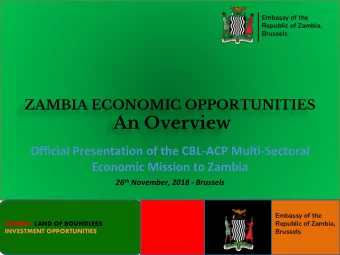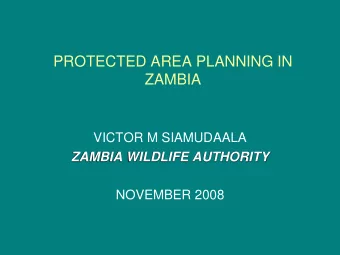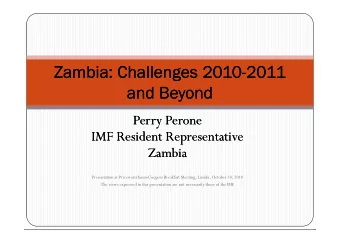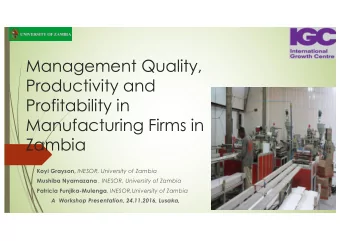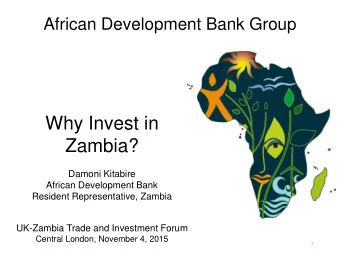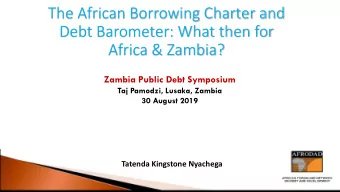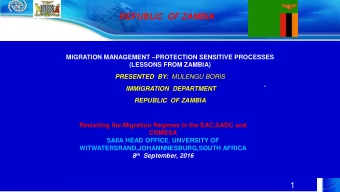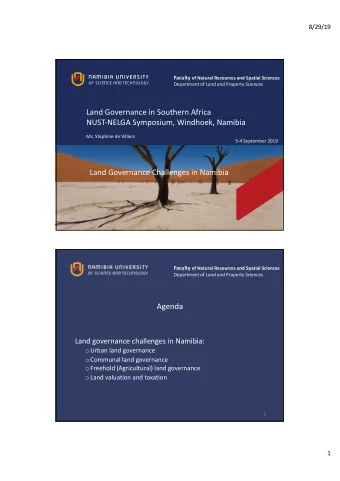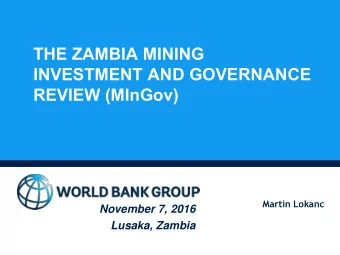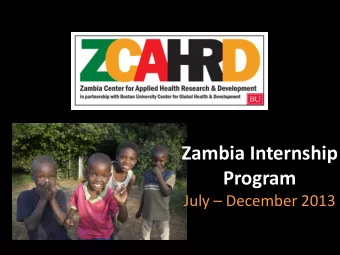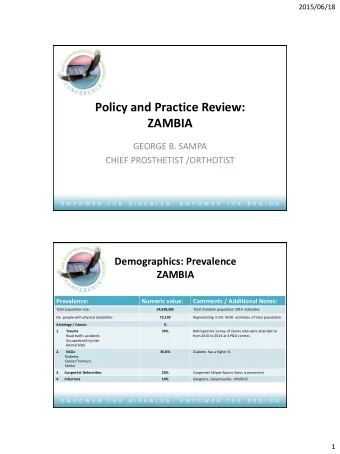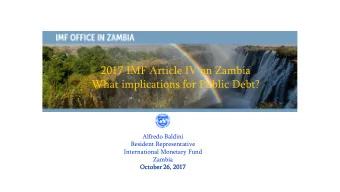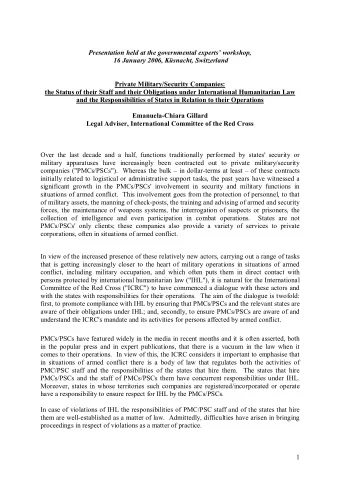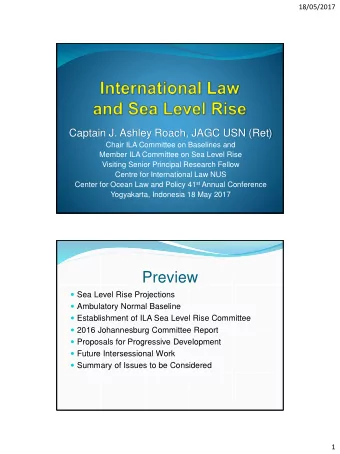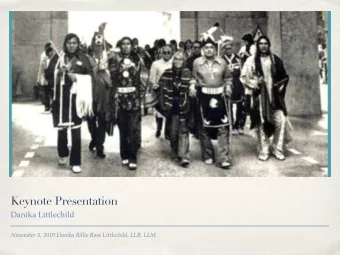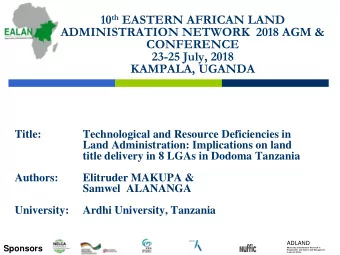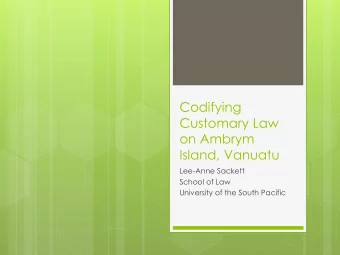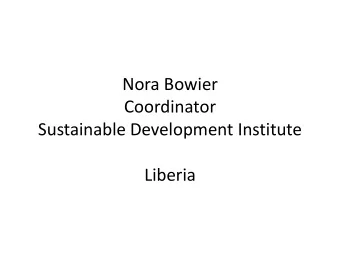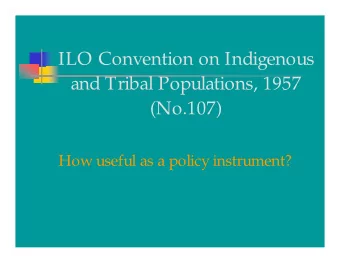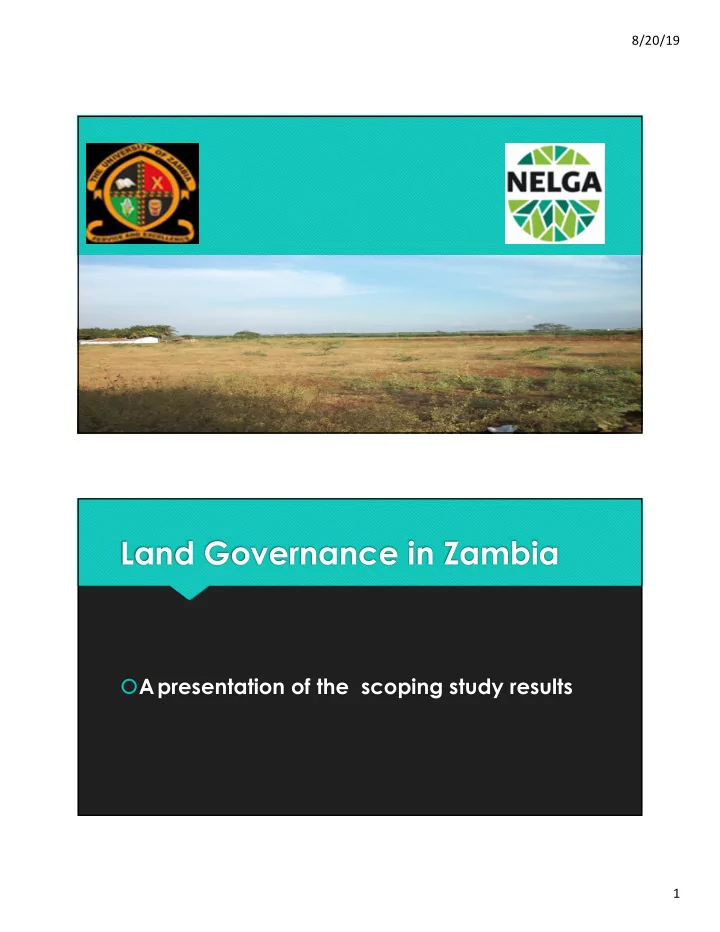
Land Governance in Zambia Apresentation of the scoping study - PDF document
8/20/19 LAND GOVERNANCE IN ZAMBIA Land Governance in Zambia Apresentation of the scoping study results 1 8/20/19 TEAM MEMBERS Dr. FATIMA MANDHU Team Leader Mr. Christopher Mulenga INTRODUCTION Zambia has a dual land tenure system
8/20/19 LAND GOVERNANCE IN ZAMBIA Land Governance in Zambia Apresentation of the scoping study results 1
8/20/19 TEAM MEMBERS Dr. FATIMA MANDHU Team Leader Mr. Christopher Mulenga INTRODUCTION § Zambia has a dual land tenure system namely statutory and customary tenure. § The dual land tenure system is a product of the country’s history of the colonial separation of the white settlers and the natives. § Statutory tenure is governed by the written rules, regulations and laws while customary tenure is regulated by customs and traditional laws 2
8/20/19 INSTITUTIONAL FRAMEWORK The existence of two tenure systems means that the institutional frameworks guiding land governance for statutory land and for customary land are different. Governance of statutory land is conducted through various Governmental institutions with the Ministry of Lands and Natural Resources. INSTITUTIONAL FRAMEWORK Customary land on the other hand is administered by traditional leaders (chiefs/chieftainesses and headpersons). Chiefs or chieftainesses and headpersons play an important role of ensuring that the land in their localities is administered for the benefit of their subjects 3
8/20/19 CONVERSION OF CUSTOMARY LAND TO STATUTORY LAND For land to be converted from customary tenure to statutory tenure the chief or chieftainess of the area where the land is situated grants or refuses to grant consent. If the chief or chieftainess grants consent an application is made to the local authorities who would make a recommendation to the commissioner of lands. CONVERSION OF CUSTOMARY LAND TO STATUTORY LAND The Commissioner of Lands may accept or refuse the recommendation made by the council. If the application is accepted a certificate of title is granted to the landholder. Land conversion can be done by customary land occupants as well as local and foreign investors. 4
8/20/19 LEGAL FRAMEWORK ON LAND TENURE IN ZAMBIA Land in Zambia is regulated by several pieces of legislation including the Constitution and each of them provide for different elements of land governance. There are approximately nine pieces of legislation that regulate land governance in Zambia. TENURE REGIMES Legal security of tenure with regards to access, ownership or use of land confers security on all individuals holding land against the threat of forced evictions or harassment to enable them enjoy their right to land freely. The statutory tenure system provides security of tenure and permits the holder to pass on the property freely to their designated heirs. The statutory tenure is subject to a registration process and to the issuance of a land title which is conclusive proof of ownership. 5
8/20/19 ENFORCEMENT OF LAND RIGHTS Ownership of land in Zambia can be vested in a single person or jointly in two or more persons. The leasehold rights given under the certificate of title to are enforceable by the owner. The rights are subject to the compliance of the covenants stated in the lease attached to the certificate of title by the owner. For customary tenure the rights of the owner are regulated under the customs and not the certificate of title or lease agreement. LAND DISPUTE RESOLUTION Disputes on state land are resolved through litigation using the formal court structure especially the lands tribunal. Alternative dispute resolution mechanisms such as arbitration and mediation are also available alongside the formal court system. Disputes on customary land on the other hand are resolved by local courts and traditional courts which are constituted by the traditional leaders. 6
8/20/19 VALUATION AND TAXATION There are two forms of valuation in Zambia, one being statutory while the other being non-statutory. Statutory valuation is done for taxation as well as land acquisition. Non- statutory valuation is for sale and purchase transactions, secured lending, insurance and accounting among others purposes. LAND USE, PLANNING AND CONTROL The legislative framework for planning and control has been revised recently in Zambia. The Urban and Regional Planning Act provides for development, planning and administration principles, standards and requirements for urban and regional planning processes and systems. The Act also provides for a framework for administering and managing urban and regional planning for the country. 7
8/20/19 CONT’D Urban and Regional Planning legislative framework provides for procedures for integrated urban and regional planning in a decentralised system of governance to ensure involvement of different stakeholders . MANAGEMENT OF PUBLIC LAND Public land has not been defined under the Lands Act but can be referred to any land that is held in trust and meant for Government use. This land is used as national parks, forest reserves, conservation areas, recreation areas and historic and cultural sites or any land set aside for public use. It therefore follows that a company or individual cannot not own public land and the government decides the purpose for which public land can be used. 8
8/20/19 PUBLIC LAND INVENTORY Land inventory is a system that serves to answer land data queries of how much, how many and where, with an emphasis on reports which derive primary data. The objective of a land inventory is data collection, input, and editing to ensure accurate and high integrity base of land data. In terms of the land inventory the available data in Zambia is a simple estimation based on research carried out for a report on the implementation of the land governance assessment framework which may not be accurate. LAND INFORMATION Land information has two main components: a textual description of each property; and a graphic representation or map often containing dimensional information. Reliable, up to date and accessible land information is vital to among other things to plan, and develop the land. In recognizing the need for a modern and publicly accessible information on land administration and management, Zambia embarked on the creation of a repository for land data through Zambia Integrated Land Management Information System (ZILMIS). 9
8/20/19 CHALLENGES IN INSTITUTIONAL FRAMEWORK Inadequate co-ordination among land administration institutions and inefficiencies are the main challenges. Currently there are too many institutions dealing in state land administration causing the problem of coordination. Although the mandates of these institutions are defined, there is inadequate co-ordination among them. inadequate coordination among these land institutions leads to problems like the same parcel of land being offered to different people by different land institutions thereby causing land disputes CONT’D Corruption is a serious challenge in the land sector in Zambia. Corrupt practices in land institutions responsible for allocation and registration as well as conversion of land are rampant. The consequence of corruption is that it is very difficult for the great majority of the people to acquire or secure statutory land on an equitable basis. On a smaller scale corruption is also present when individuals are granted land by the traditional authorities in circumstances where they are not entitled to the land parcels. 10
8/20/19 CONT’D Challenge specific to conversion of land is that Tradition leaders lack of knowledge and are unwillingness to convert customary land. Another issue that is prominent under customary tenure is the lack of willingness by some chiefs or chieftainesses to consent to conversion of customary tenure to statutory tenure. The major challenge of conversion is that customary tenure would be abolished if most of the land is converted to statutory land. CHALLENGES IN LEGAL FRAMEWORK § Outdated Land Laws § Fragmented laws regulating land § Challenges relating to tenure rights under statutory land is that tenure rights are secured expect where land is compulsorily acquired by the state § Challenges relating to tenure rights under customary land is that the form of tenure is considered unsecured § Challenges in Land Registration systems arise because of the deeds systems as opposed to the titles system where rights are guaranteed by the state. 11
8/20/19 CHALLENGES IN VALUATION AND TAXATION Challenges in the valuation process include lack of data, negligence, informality and volatility of the property markets Challenges in the taxation process is mainly the sensitization of the existence of the Tax Appeals Tribunal Challenges in the payment of tax include late or non payment of taxes relating to property CHALLENGES IN DISPUTE RESOLUTION Challenges in the formal court system include access and high cost of litigation Challenges of Lands Tribunal include access and highly centralized location Challenges of Alternate Dispute Resolution are access, lack of information and publicity and the limited roles that CSO and NGO play is resolving land disputes. 12
Recommend
More recommend
Explore More Topics
Stay informed with curated content and fresh updates.

